





BILLEY LE
“I want to help them become productive members of society. I want to be there for people in need.”
GABRIEL SINGER
“I developed a bad attitude toward authority; and I continued that attitude toward society.”
DONALD DIGGS
“In those days, when you went to prison for life, you felt like this was your life until you died.”



Questions or comments about Excell Network described in this publication should be directed to Julio Escobar at (415) 614-5572 or email to escobarj@sfarch.org. All rights reserved. No part of the material printed may be reproduced or used in any form or by any means, electronic or mechanical, including photocopying, recording or by any information storage retrieval system without the permission of the publisher. The Archdiocese of San Francisco. All contributions are tax deductible. No goods or services are provided in exchange for any contribution.
Billey Le
Gabriel Singer
Donald Diggs
Dana Perrigan
Eduardo Banos
Maureen Lundy
Jan Potts
Julio Escobar
Valerie Schmalz
EXCELL NETWORK MAGAZINE SPRING 2024 NINTH ISSUE RESTORATIVE JUSTICE EXCELL NETWORK BREAKFAST STUDENT TESTIMONIALS
•
•
•
•
•
•
•
•
•
CONTRIBUTORS IN THIS ISSUE: SUPPORT THE EXCELL NETWORK SCHOLARSHIP FUND
PAGE
4
PAGE 7 PAGE
PAGE
14
10
2 | EXCELL NETWORK MAGAZINE - Spring 2024 - Ninth Issue sfarch.org/excellnetwork sfarch.org/excellnetwork
Into the Light
There are many ways to talk about light. For example, the reflection of light consists in the change of direction of the light beam as soon as it reaches a surface and bounces backreflected light. This makes visible objects that do not normally emit light of their own.
There are also various sources of physical light, which we classify as natural and artificial.
Light is a form of energy that illuminates things, makes them visible, and is scattered by particles called photons. Light makes possible the existence of the Internet and the information that is shared through it e.g. emails, images and videos.
Light is also instrumental in the production of solar energy and in the power of LEDs and GPS navigators, and it contributes to the functioning of mobile phones, microwaves and televisions.
During this past winter, we experienced power outages without warning, which was very unpleasant and inconvenient due to our dependence on light to provide so many of our needs.
After Jesus taught his disciples to pray; He spoke of light in three short sentences. He started with a reference to physical light and then talked about the light within us and said: “No one after lighting a lamp puts it in a cellar or under a basket, but on a lampstand, so that those who enter may see the light.” Luke 11:33-36
Jesus helps us understand that He is the light in our lives when we act according to His commandments, that by obeying God's law we, ourselves, become instruments or sources of light.
Because of our faith in Jesus, and the commitment to truth and goodness in the lives of the students of Excell Network, we believe that God is their light and their strength of their lives.
Hacia la Luz
Hay muchas maneras de hablar de la luz. Por ejemplo, la reflexión de la luz consiste en el cambio de dirección del haz de luz tan pronto como llega a una superficie y rebota: luz reflejada. Esto hace visibles objetos que normalmente no emiten luz propia.
También existen diversas fuentes de luz física, que clasificamos como naturales y artificiales.
La luz es una forma de energía que ilumina las cosas, las hace visibles y es dispersada por partículas llamadas fotones. La luz hace posible la existencia de Internet y la información que se comparte a través de ella, por ejemplo, correos electrónicos, imágenes y videos. La luz también es fundamental en la producción de energía solar y en la potencia de los LED y los navegadores GPS, y contribuye al funcionamiento de los teléfonos móviles, el microondas y los televisores.
 Julio Escobar Coordinator Restorative Justice Ministry
Julio Escobar Coordinator Restorative Justice Ministry
Durante este pasado invierno, experimentamos cortes de energía sin previo aviso, lo cual fue muy desagradable e inconveniente debido a nuestra dependencia de la luz para satisfacer tantas de nuestras necesidades.
Después de que Jesús enseñó a sus discípulos a orar; Habló de la luz en tres breves frases. Comenzó con una referencia a la luz física y luego habló de la luz dentro de nosotros y dijo: "Nadie después de encender una lámpara la pone en un sótano o debajo de una canasta, sino en un candelabro, para que los que entren vean la luz". Lucas 11:33-36
Jesús nos ayuda a entender que Él es la luz en nuestras vidas cuando actuamos de acuerdo con Sus mandamientos, que al obedecer la ley de Dios nos convertimos en instrumentos o fuentes de luz.
Debido a nuestra fe en Jesús, y el compromiso con la verdad y la bondad en las vidas de los estudiantes de Excell Network, creemos que Dios es su luz y la fuerza de sus vidas.


sfarch.org/excellnetwork EXCELL NETWORK MAGAZINE - Spring 2024 - Ninth Issue | 3
BILLEY LE
By Dana Perrigan Writer | Journalist | Book Author
Billey Le remembers it as a crazy stage a time when everything was going wrong in his life.
One of his friends died in an accident while cooking up a batch of drugs. Another overdosed on Billey’s birthday. He and his girlfriend broke up. He had an unresolved drug charge hanging over his head and, with three strikes already against him, his future looked bleak.
“At that time, I was on hella drugs up three or four days at a time,” he says. “My brain was, like, fried. I didn’t know what was real and what wasn’t real. I was lost.”
Realizing how lost he was, Billey did something he had never done before. He got down on his knees and prayed to God.
“I didn’t know what else to do,” he says. “I was losing my mind.”
Growing up in San Jose with his parents and older brother, religion had never played much of a role in his life, although his parents hard-working Vietnamese immigrants were Buddhist.
“I guess you could say I had a pretty normal childhood,” says Billey. “My parents worked a lot, so I had a lot of time on my own. My brother, who was 10 years older, was more like another parent.”
In junior high, things veered away from normal. He started smoking marijuana and hanging out with “the wrong people.” In the eighth grade, he got expelled for bringing a BBgun to school.

“It wasn’t the best of times for me,” he says. “It was a struggle. I started selling drugs to support myself.”
He also started breaking into homes. At the age of 18, he was caught and convicted of three residential burglaries. He spent a year in county jail.
After losing his case on the marijuana charge, Billey was back in county jail. A month into his incarceration, he was charged with a crime he thought he had gotten away with. He had held up a pharmacy. The DNA evidence he had left behind finally caught up with him. Upon his conviction, he received an 11-year prison sentence.
I want to help them become productive members of society. I want to be there for people in need.
“ “
The downward trajectory of his life continued in high school. He got into different drugs. First it was ecstasy. Next he was snorting coke. Then it was crystal meth. Staying up for days at a time on the stuff, he started cutting classes. The relationship with his parents deteriorated.
Some time later, high on drugs, he crashed his car. When the police officers showed up, they found three pounds of marijuana in it. Billey still owed money on the marijuana.
Out on bail and fighting his case, he started robbing other drug dealers at gunpoint. But instead of using the money from the robberies to pay his drug debt, he bought more drugs.
While in county jail, away from the drugs he had been addicted to and the people he had been associating with, Billey began seeking God. He joined a Vietnamese Bible study group. His request for personal instruction in the Christian faith was answered by a Catholic nun, Sister May Ann of Compton, who visited him once a week for a year.
4 | EXCELL NETWORK MAGAZINE - Spring 2024 - Ninth Issue sfarch.org/excellnetwork
Photo by PROPEL: Bay Area Peer Professional Network at 2023 Reentry
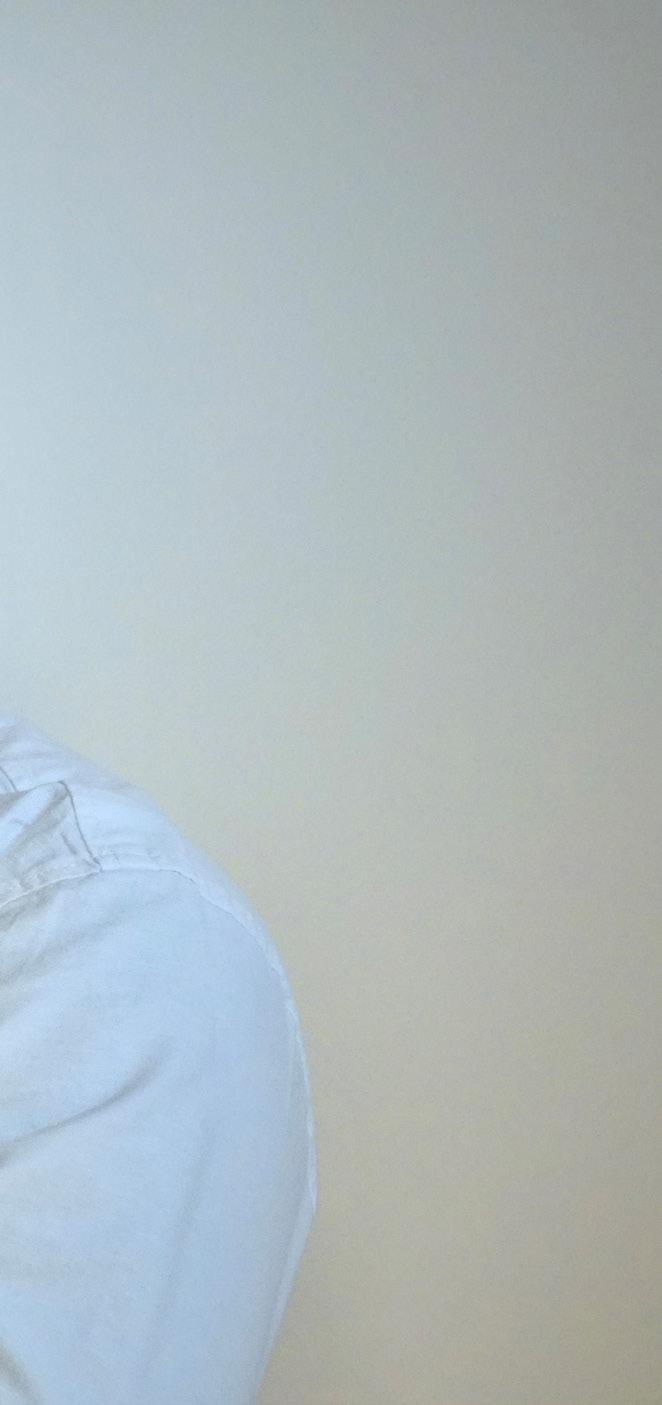
Billey Le recuerda una etapa loca fue un tiempo en el que todo iba mal en su vida.
Uno de sus amigos murió en un accidente mientras cocinaba un lote de drogas. Otra murió de sobredosis el día del cumpleaños. Él y su novia rompieron. Tenía un cargo de drogas sin resolver sobre su cabeza y, con tres cargos ya en su contra, su futuro parecía sombrío.
"En ese momento, estaba tomando drogas increíbles, hasta tres o cuatro días seguidos", dice. “Mi cerebro estaba como frito. No sabía qué era real y qué no era real. Yo estaba perdido."
Al darse cuenta de lo perdido que estaba, Billey hizo algo que nunca antes había hecho. Se arrodilló y oró a Dios.
"No sabía qué más hacer", dice. “Estaba perdiendo la cabeza”.
Al crecer en San José con sus padres y su hermano mayor, la religión nunca había jugado un papel importante en su vida, aunque sus padres, trabajadores inmigrantes vietnamitas, eran budistas.
"Supongo que se podría decir que tuve una infancia bastante normal", dice Billey. “Mis padres trabajaban mucho, así que yo tenía mucho tiempo solo. Mi hermano, que era 10 años mayor, era más como otro padre”.
En la secundaria, las cosas se alejaron de lo normal. Comenzó a fumar marihuana y a salir con "la gente equivocada". En octavo grado, lo expulsaron por llevar una pistola de aire comprimido a la escuela.
La trayectoria descendente de su vida continuó en la escuela secundaria. Se metió en diferentes drogas. Primero fue el éxtasis. Luego estaba inhalando cocaina. Luego fue la metanfetamina. Permaneciendo despierto durante días seguidos con esas cosas, comenzó a faltar a clases. La relación con sus padres se deterioró.
"No fueron los mejores momentos para mí", dice. “Fue una lucha constante. Empecé a vender drogas para poder mantenerme”.
También empezó a robar en casas. A la edad de 18 años, fue capturado y condenado por tres robos residenciales. Pasó un año en la cárcel del condado.
Algún tiempo después, drogado, chocó su auto. Cuando llegó la policía, encontraron tres libras de marihuana en el interior. Billey todavía debía

dinero por la marihuana. En libertad bajo fianza y peleando su caso, comenzó a robar a otros traficantes de drogas a punta de pistola. Pero en lugar de utilizar el dinero de los robos para pagar su deuda de drogas, compraba más drogas.
Después de perder su caso por el cargo de marihuana, Billey regresó a la cárcel del condado. Un mes después de su encarcelamiento, fue acusado de un delito del que pensó que se había salido con la suya. Había asaltado una farmacia. Desafortunadamente La evidencia de ADN que había dejado finalmente lo alcanzó. Tras su condena, recibió una sentencia de 11 años de prisión.
Mientras estaba en la cárcel del condado, lejos de las drogas a las que había sido adicto y de las personas con las que se había asociado, Billey comenzó a buscar a Dios. Se unió a un grupo de estudio bíblico vietnamita. Su solicitud de instrucción personal en la fe cristiana fue respondida por una monja católica, la hermana May Ann de Conplon, quien lo visitó una vez por semana durante un año.
“Ella fue probablemente la persona que más me ayudó durante mi encarcelamiento y me guió hacia mi propósito”, dice Billey, quien decidió convertirse al catolicismo. Aproximadamente un año después, fue bautizado.
Reentry Conference
sfarch.org/excellnetwork EXCELL NETWORK MAGAZINE - Spring 2024 - Ninth Issue | 5
Photo by Julio Escobar. Billey Le speaking at a Excell Network breakfast.
“She was probably the most helpful person during my incarceration, and led me to my purpose,” says Billey, who decided to convert to Catholicism. A year or so later, he was baptized.
After being sent to prison, Billey continued going to church, but the Catholic services were in Spanish, and he couldn’t understand much of it. He studied the Bible on his own, prayed the rosary, and read a lot of books, whatever he could get his hands on. He also enrolled in a couple of college classes, which helped him figure out what he wanted to do with his life.
“I want to help people who were formerly incarcerated, drug users, homeless people,” he says. “I want to help them become productive members of society. I want to be there for people in need.”
Eight years into his prison sentence, Billey was released. At first, he says, he felt a little lost, but he is grateful that he has a chance to build a life for himself in a new environment. Through Project Rebound, he enrolled in San Francisco State University. He plans to earn a bachelor’s degree, with a major in psychology, in a couple of years. After that, he will pursue a master’s degree, which will put him in a strong position to help others. He’s also working on getting a mental health peer counseling certificate, which will enable him to work as part of a team reaching out to people on the street.
His life now, says Billey, is full of hope a stark contrast to what it once was.
“It has been nothing but happiness to me,” he says.
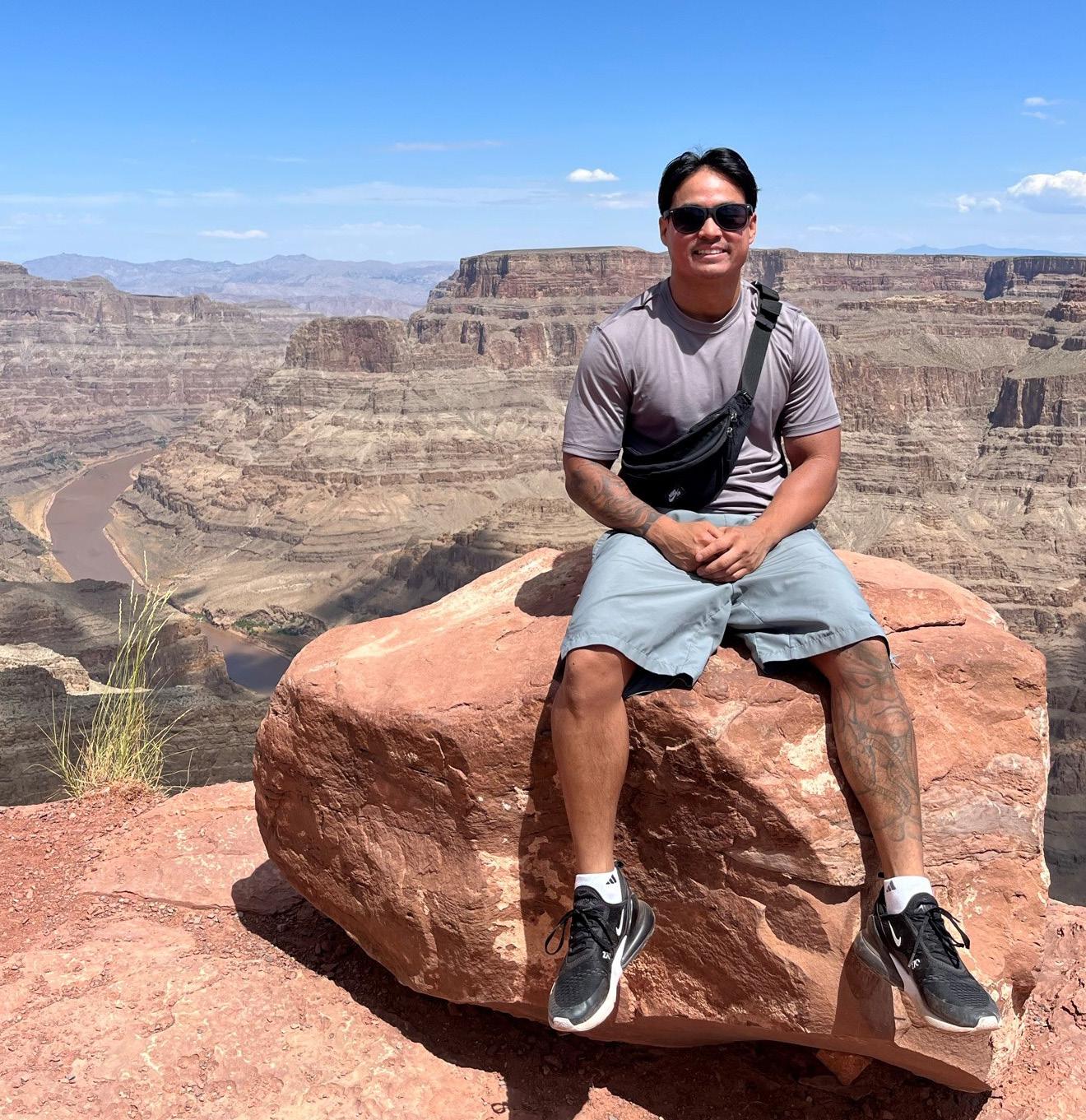

Después de ser enviado a prisión, Billey continuó yendo a la iglesia, pero los servicios católicos eran en español y no podía entender mucho. Estudió la Biblia por su cuenta, rezó el rosario y leyó muchos libros, cualquier cosa que pudiera conseguir. También se matriculó en un par de clases universitarias, lo que le ayudó a descubrir qué quería hacer con su vida.
“Quiero ayudar a las personas que estuvieron encarceladas, a los consumidores de drogas y a las personas sin hogar”, dice. “Quiero ayudarlos a convertirse en miembros productivos de la sociedad. Quiero estar ahí para las personas necesitadas”.
Ocho años después de su sentencia de prisión, Billey fue puesto en libertad. Al principio, dice, se sintió un poco perdido, pero está agradecido de tener la oportunidad de construirse una vida en un nuevo entorno. A través del Proyecto Rebote, se matriculó en la Universidad Estatal de San Francisco. Planea obtener una licenciatura con especialización en psicología en un par de años. Después de eso, obtendrá una maestría, lo que lo colocará en una posición sólida para ayudar a los demás. También está trabajando para obtener un certificado de asesoramiento entre pares en materia de salud mental, lo que le permitirá trabajar como parte de un equipo que se acerca a la gente de la calle.
Su vida ahora, dice Billey, está llena de esperanza, un marcado contraste con lo que alguna vez fue.
"Para mí no ha sido más que felicidad", afirma.
Photo by a co-student. Billey Le presenting at San Francisco State University.
6 | EXCELL NETWORK MAGAZINE - Spring 2024 - Ninth Issue sfarch.org/excellnetwork
Photo by family. Bilely Le on an Arizona vacation.
GABRIEL SINGER
I developed a bad attitude toward authority; and I continued that attitude toward society “ “
For Gabe Singer, entering prison for the first time was kind of like landing on another planet.
It was a hostile world and, right away, he saw that the inmates had segregated themselves into groups based mainly on race. And even though he wound up in his racial group, he wasn’t entirely comfortable with the arrangement.
He also had to learn how to come to terms with the reasons why he was in prison, and what he was going to do about it.
“It was a tough transition,” he says. “I finally had to figure out what was best for me, because acting out in prison, in a hostile environment, you either end up in the SHU (segregated housing unit) or dead.”
Where he ended up, he would discover, was largely up to him.
Where he started out was a different matter.
Born and raised in Southern California, Gabe lived with his parents and younger brother. Elementary school went OK, he says, but in junior high things started to go sideways. He had a host of disabilities,
including ADHD. He was a hyper kid who found it difficult to concentrate on what was going on in the classroom.
“You feel the shame and the alienation of not being able to keep up with the class,” he says. “So, I acted out. Due to those negative education experiences, I made an irrational decision not to participate in school.”
Para Gabriel “Gabe”
Singer, entrar en prisión por primera vez fue como aterrizar en otro planeta.
Era un mundo hostil y, enseguida, vio que los reclusos se habían segregado en grupos basados principalmente en la raza. Y aunque terminó en su grupo racial, no se sentía del todo cómodo con el acuerdo.
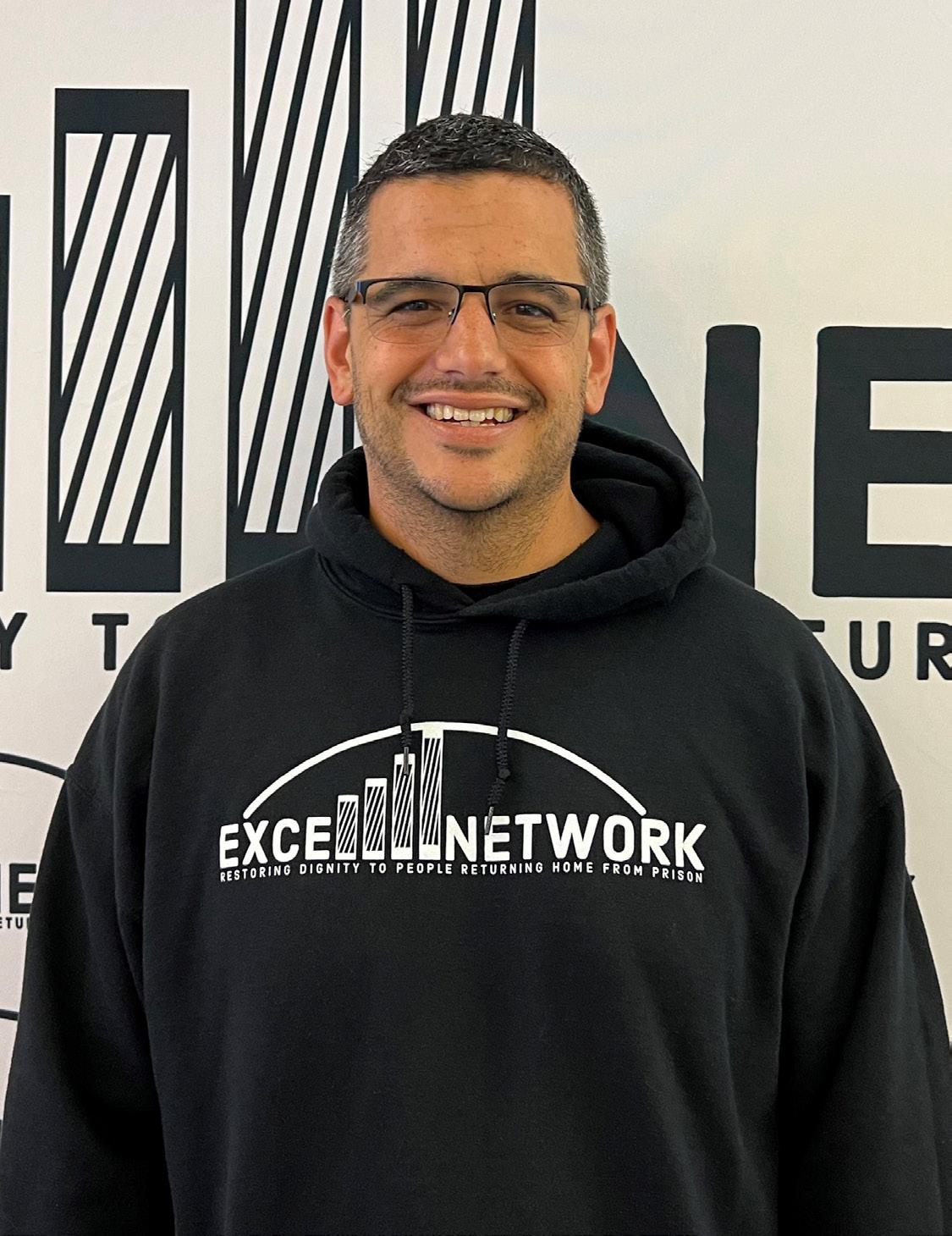 By Dana Perrigan Writer | Journalist | Book Author
By Dana Perrigan Writer | Journalist | Book Author
También aprendió a aceptar las razones por las que estaba en prisión y lo que iba a hacer al respecto.
"Fue una transición difícil", dice. “Finalmente tuve que decidir qué era mejor para mí, porque actuar en prisión, en un ambiente hostil, o terminas en la SHU (unidad de vivienda segregada) o terminas muerto”.
Descubriría que dónde terminaría dependía en gran medida de él.
Dónde empezó fue un asunto diferente.
Nacido y criado en el sur de California, Gabe vivía con sus padres y su hermano menor. La escuela primaria fue bien, dice, pero en la secundaria las cosas empezaron a ir mal. Tenía una serie de discapacidades, incluido el TDAH. Era un niño hiperactivo al que le resultaba difícil concentrarse en lo que sucedía en el aula.
“Sientes la vergüenza y la alienación de no poder seguir el ritmo de la clase”, dice. “Así que actué mal. Debido a esas experiencias educativas negativas, tomé la decisión irracional de no participar en la escuela”.
sfarch.org/excellnetwork EXCELL NETWORK MAGAZINE - Spring 2024 - Ninth Issue | 7
Photo by Julio Escobar, Gabriel Singer after giving his presentation and testimonial at a Excell Network breakfast.
Instead, he followed his own interests. One of them was photography. Another was skateboarding.
Since skateboarding parks were almost nonexistent, says Gabe, he and his friends took to the streets and ran from the cops to avoid being cited.
“I developed a bad attitude toward authority,” he says, “and I continued that attitude toward society.”
Hanging out with kids who shared that attitude led to trouble. Gabe was never locked up in juvenile hall, but he was arrested once for stealing a golf cart. Later, as an adult, he spent a few days in jail for unpaid skateboarding tickets.
Still later, he recalls, he got involved in some violent incidents he was stabbed once in an argument over a parking space. Angry and feeling vulnerable, he decided to take a gun to a party. When someone pulled a gun on him, he shot into the air.
Someone else fired their gun and a partygoer got shot.
Convicted of aiding and abetting an unknown assailant, Gabe received the maximum sentence 21 years in prison.
In prison, Gabe eventually came to the realization that “you have to focus either on rehabilitation or not on rehabilitation.”
He chose the former.
Halfway through his sentence, he says, three things happened that would change the trajectory of his life. A former girlfriend visited him. They rekindled their friendship a friendship that would eventually lead to marriage. Secondly, he worked hard on understanding and healing the trauma related to what he had experienced in school. Lastly, he took advantage of a prison program that offered cognitive behavioral therapy.

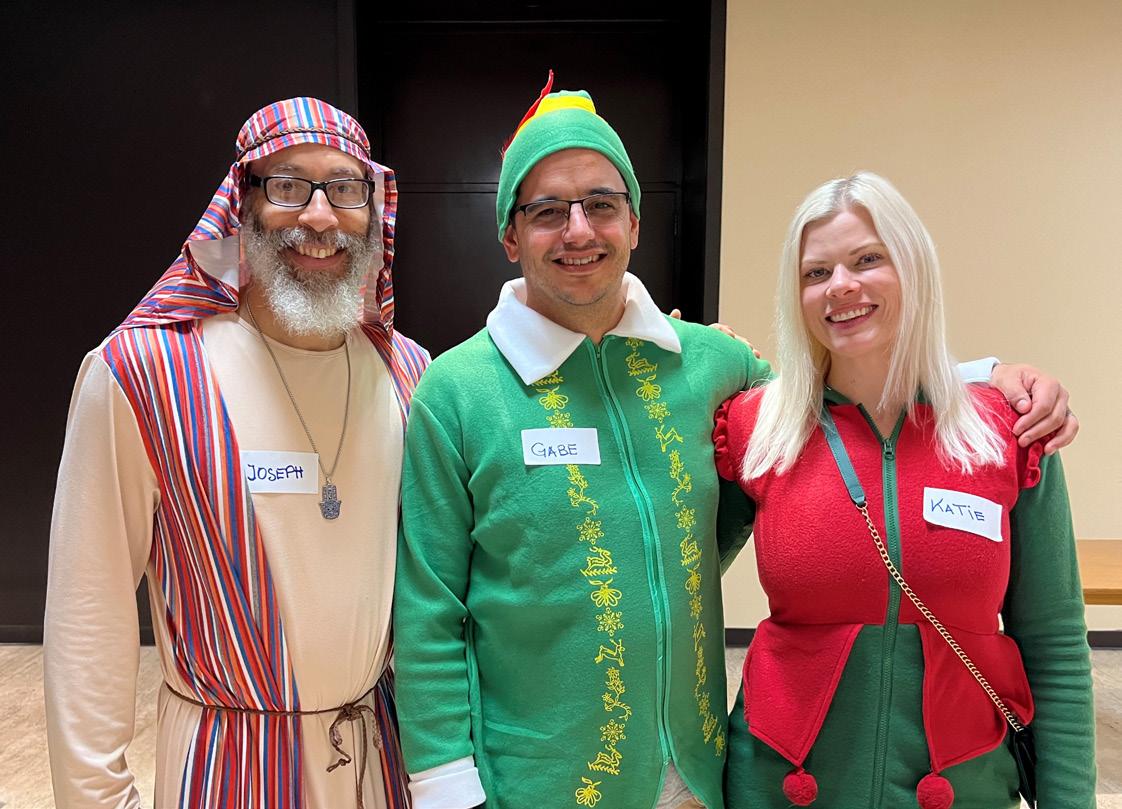
En cambio, siguió sus propios intereses. Uno de ellos fue la fotografía. Otra era andar en patineta, una actividad que era ilegal en el estado en ese momento. Como los parques para patinetas eran casi inexistentes, dice Gabe, él y sus amigos salían a las calles y huían de la policía para evitar ser citados.
"Desarrollé una mala actitud hacia la autoridad", dice, "y continué esa actitud hacia la sociedad".
Salir con niños que compartían esa actitud generaba problemas. Gabe nunca estuvo encerrado en un centro de menores, pero una vez fue arrestado por robar un carrito de golf. Más tarde, ya adulto, pasó unos días en la cárcel por no pagar multas recibidas por andar en patineta.
Aún más tarde, recuerda, se vio involucrado en algunos incidentes violentos: una vez fue apuñalado durante una discusión por un lugar para estacionar. Enojado y sintiéndose vulnerable, decidió llevar un arma a una fiesta. Cuando alguien le apuntó con un arma, disparó al aire. Alguien más disparó su arma y un asistente a la fiesta recibió un disparo.
Condenado por ayudar e instigar a un agresor desconocido, Gabe recibió la sentencia máxima: 21 años de prisión”.
En prisión, Gabe finalmente se dio cuenta de que “hay que centrarse en la rehabilitación o no”.
Eligió lo primero.
A mitad de su sentencia, dice, sucedieron tres cosas que cambiarían la trayectoria de su vida. Una ex novia lo visitó. Reavivaron su amistad, una amistad que eventualmente los llevaría al matrimonio. En segundo lugar, trabajó duro para comprender y sanar el trauma relacionado con lo que había experimentado en la escuela. Por último, aprovechó un programa penitenciario que ofrecía terapia cognitivoconductual.
Photo by Julio Escobar, Joseph Bauman, Gabriel and Katie Singer at the Restorative Justice Christmas Angels 2023
8 | EXCELL NETWORK MAGAZINE - Spring 2024 - Ninth Issue sfarch.org/excellnetwork
Photo by family member, Gabriel Singer speaking at San Francisco State University on Reentry and Resources
“It gave me the social and emotional tools I needed to learn how to deal with negative stuff in a positive way,” he says. “It gave me the tools for making positive decisions even though I was in a negative environment and that’s when the real Gabe showed up.”
The real Gabe concentrated on pursuing the education he had once abandoned. He earned his G.E.D. He earned an A.A. degree in behavioral science through Coastline Community College. He wrote to Project Rebound, a program that enables formerly incarcerated people to enroll in college upon their release. He became a peer mentor and, later, a counselor, in the G.O.G.I. (Getting Out by Going In) prison program. He received a paralegal certificate and another in business management.
“I really doubled down on education,” says Gabe. “I went from one extreme to the other.”
Gabe was released from prison last December. He is now a full-time student at San Francisco State University, pursuing a bachelor’s degree in philosophy and pre-law while working at Larkin Street Youth Services. He teaches a class in restorative justice and practices at an experimental college associated with SFSU.
Looking ahead, Gabe is intent on serving the community he has come to know. He wants to teach restorative justice, and work to influence policies
that will bring about prison reform.
“My main focus is eliminating the stigma of incarceration,” he says. “I don’t believe in bad guys. I believe most men and women in prison are intelligent and capable. When society can embrace that, you will see an entire population demonstrate what they can do.
“I’m not gonna stop.”
"Me dio las herramientas sociales y emocionales que necesitaba para aprender a lidiar con las cosas negativas de manera positiva", dice. "Me dio las herramientas para tomar decisiones positivas a pesar de que estaba en un entorno negativo, y fue entonces cuando apareció el verdadero Gabe".
El verdadero Gabe se concentró en continuar con la educación que una vez había abandonado. Obtuvo su G.E.D. Obtuvo un título de A.A. Licenciatura en ciencias del comportamiento a través de Coastline Community College. Escribió Project Rebound, un programa que permite a personas ex encarceladas inscribirse en la universidad tras su liberación. Se convirtió en mentor de pares y, más tarde, en consejero, en el programa penitenciario G.O.G.I. (Salir entrando). Recibió un certificado de asistente legal y otro en gestión empresarial.


“Realmente redoblé mi apuesta por la educación”, dice Gabe. “Pasé de un extremo al otro”.
Gabe salió de prisión en diciembre pasado. Ahora es un estudiante de tiempo completo en la Universidad Estatal de San Francisco y está cursando una licenciatura en filosofía y derecho mientras trabaja en Larkin Street Youth Services. Imparte una clase de justicia restaurativa y practica en una universidad experimental asociada con SFSU.
De cara al futuro, Gabe tiene la intención de servir a la comunidad que ha llegado a conocer. Quiere enseñar justicia restaurativa y trabajar para influir en las políticas que conduzcan a la reforma penitenciaria.
"Mi objetivo principal es eliminar el estigma del encarcelamiento", finaliza Gabe, agregando que “No creo en los malos. Creo que la mayoría de los hombres y mujeres en prisión son inteligentes y capaces. Cuando la sociedad pueda aceptar eso, veremos a toda una población demostrar lo que pueden hacer.
Photo by family member. Gabriel Singer enjoying a weekend in an Ocean Beach, San Francisco
sfarch.org/excellnetwork EXCELL NETWORK MAGAZINE - Spring 2024 - Ninth Issue | 9
Photo by Katie Singer, Gabriel voting for the first time
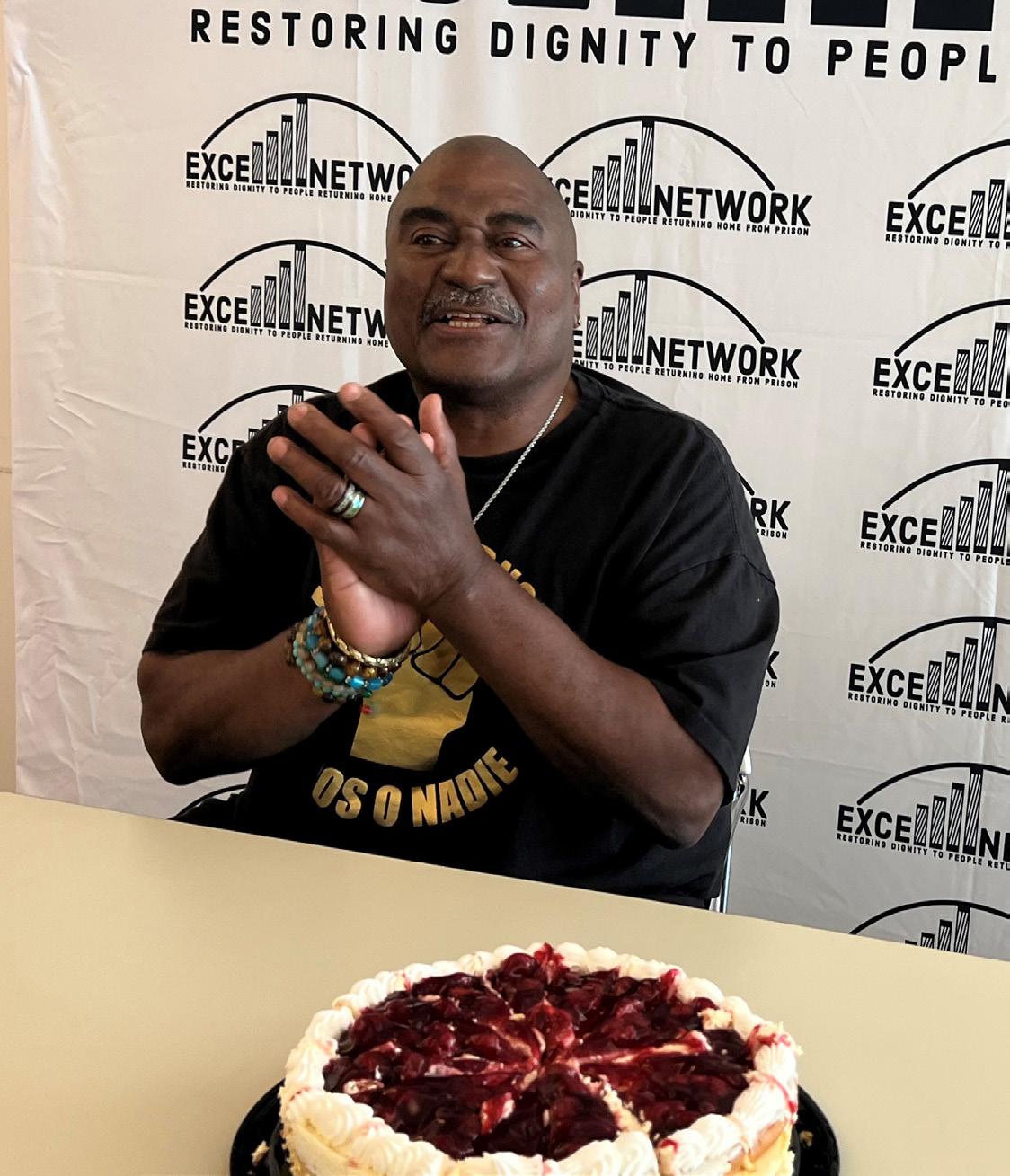
Donald Diggs is a man with a mission: To live the rest of his life in such a way that it honors the man whose life he took 45 years ago.
“To honor him I gotta do the best I can,” he says. “That’s why I’m doing what I do now.”
Since being released from prison nine months ago, Donald has been busy. He enrolled in Laney College, where he is pursuing an Associate of Arts degree in psychology. Through the training he received from the Mandela Project, he works as a prep cook at Just Fare. In July, he was baptized at the Mormon Temple in Oakland. Recently accepted into the Excell Network Program, he speaks to youth about his experiences in hopes that they might learn from his story.
DONALD DIGGS
By Dana Perrigan Writer | Journalist | Book Author
Donald Diggs es un hombre con una misión: vivir el resto de su vida de tal manera que honre al hombre cuya vida le quitó hace 45 años.
"Para honrarlo tengo que hacer lo mejor que pueda", dice. "Por eso estoy haciendo lo que hago ahora".
“I stay busy,” says Donald. “I’m trying to find my way.”
Donald’s story begins in New Mexico, where he was born into a military family. The family his parents, younger brother and four sisters moved to Seaside in Monterey County, when his father, who was in the Army, was transferred to Fort Ord.
Donald played sports, got good grades, and enjoyed the outdoor activities the beautiful area offered.
“I was blessed,” he says. “I just didn’t know it.”
When he was 10, his parents separated and later, divorced a blow whose effects he would only realize much later.
“I kind of had a rebellious side in me for most of my life,” he says.
Desde que salió de prisión hace nueve meses, Donald ha estado ocupado. Se matriculó en Laney College, donde está cursando un título asociado en psicología. Gracias a la formación que recibió del Proyecto Mandela, trabaja como cocinero en Just Fare. En julio, fue bautizado en el Templo Mormón de Oakland. Recientemente aceptado en el programa Excell Network, habla con los jóvenes sobre sus experiencias con la esperanza de que puedan aprender de su historia.
“Me mantengo ocupado”, dice Donald. "Estoy tratando de encontrar mi camino".
La historia de Donald comienza en Nuevo México, donde nació en una familia de militares. La familia (sus padres, su hermano menor y sus cuatro hermanas) se mudó a Seaside en el condado de Monterey, cuando su padre, que estaba en el ejército, fue transferido a Ft. Orden. Donald practicó deportes, obtuvo buenas calificaciones y disfrutó de las actividades al aire libre que ofrecía la hermosa zona.
"Fui bendecido", dice. "Simplemente no lo sabía".
Cuando tenía 10 años, sus padres se separaron y luego se divorciaron, un golpe cuyos efectos sólo se daría cuenta mucho más tarde.
"Tuve un lado rebelde durante la mayor parte de mi vida", dice.
“
In those days, when you went to prison for life, you felt like this was your life until you died.
“
10 | EXCELL NETWORK MAGAZINE - Spring 2024 - Ninth Issue sfarch.org/excellnetwork
Photo by Julio Escobar. Donald Diggs celebrating his birthday during an Excell Network breakfast.
After his father left, Donald stayed with his mother. Being the older brother, Donald says he tried to step up for the family when he got older. When a local fishing boat captain offered him a job as a deckhand, he jumped at the chance.
“His own son got seasick, so he took me on, and I just fell in love with fishing. I was thinking of someday getting my own boat.”
Life, says Donald, was pretty good. He worked hard and played hard.
“I used to go out and party a lot,” he says. “My drinking turned into my alcoholic nature. I thought I was being a man.”
When he was 21, Donald took the test and received his pilot’s license at the Presidio of San Francisco. But then, a few years later, he got into a fight with a man on another fishing boat. The man died, and Donald, following his conviction in 1979, received a life sentence in prison. He was 26.
“In those days,” he says, “when you went to prison for life, you felt like this was your life until you died.”
That life changed dramatically, says Donald, when he received the news of his mother’s death in 1993.
“It really affected me,” he says. “I was in a state of confusion. I felt like I had let her down. After her death, I went through a lot of self-reflection. I looked at my behavior and all the things I stood for.”
Donald, who says he had never been very religious, started going to church.
“It changed my life,” he says. “It kind of gave me a guideline for my life.”
Through a program called Rising Scholars at Soledad State Prison, he began taking classes. He continued doing so for the next nine years. When the Covid pandemic hit, and the teachers stopped coming into the prison, he took correspondent courses.
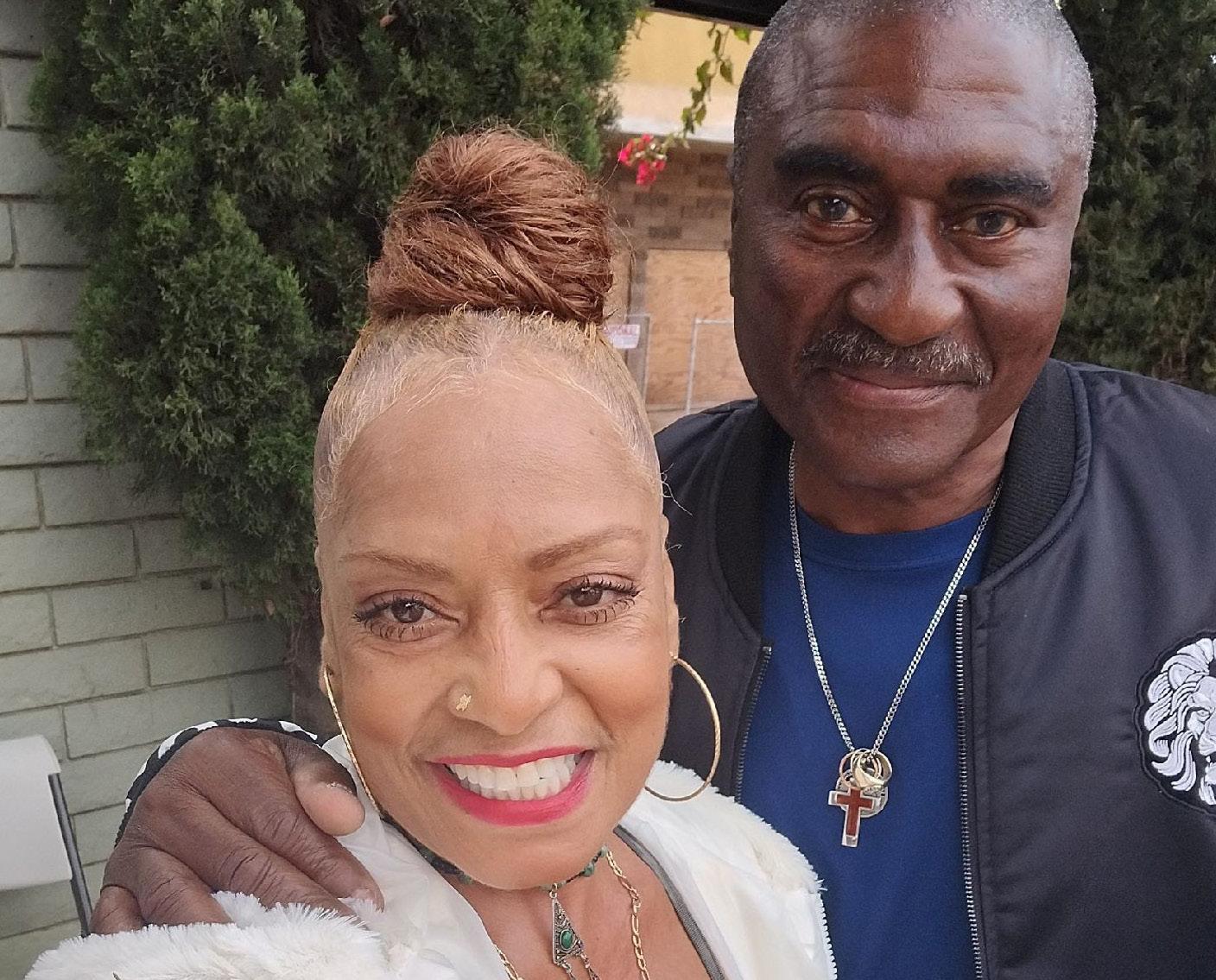
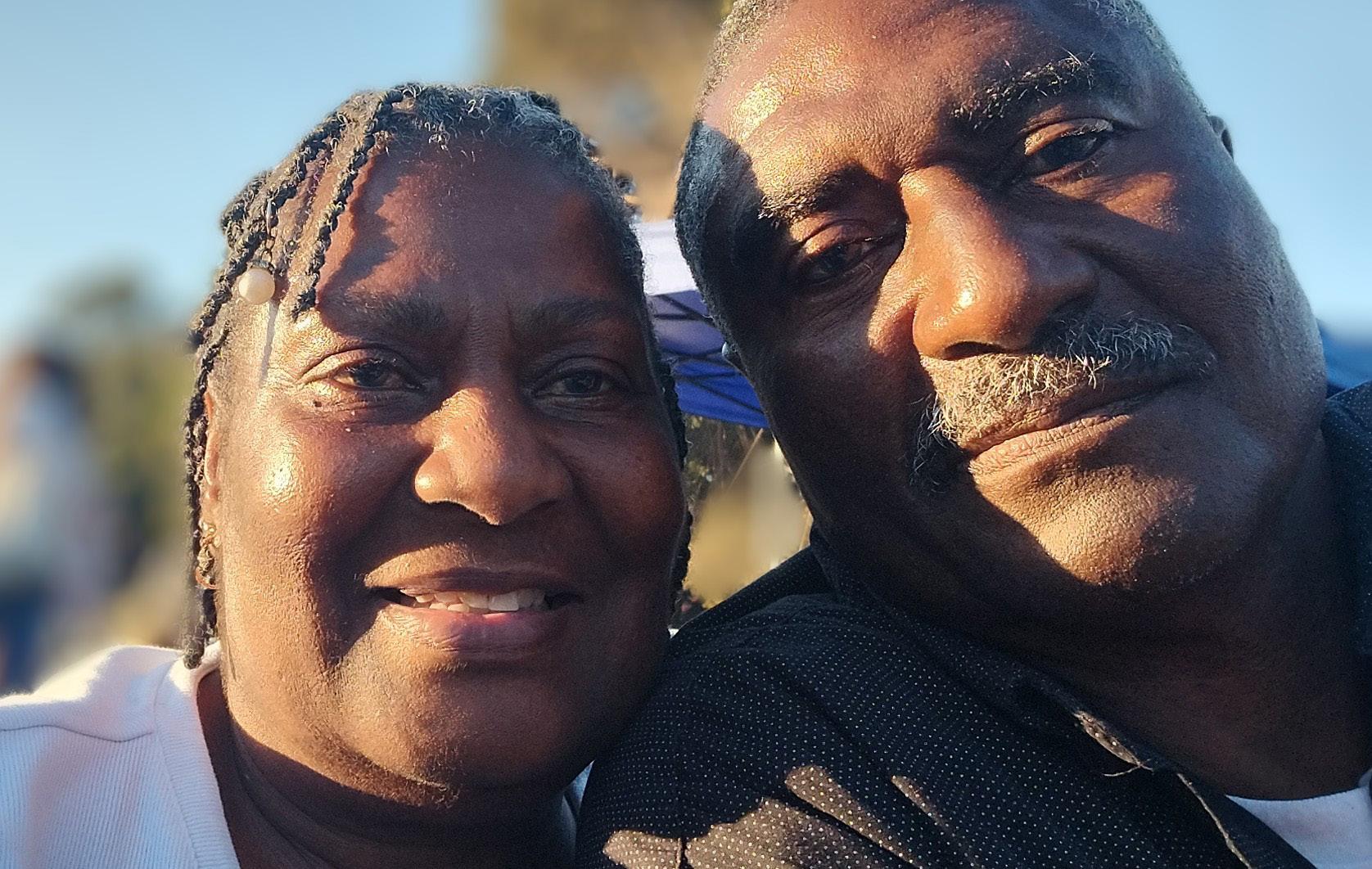
Después de que su padre se fue, Donald se quedó con su madre. Siendo el hermano mayor, Donald dice que trató de ayudar a la familia cuando creció. Cuando el capitán de un barco pesquero local le ofreció un trabajo como marinero, aprovechó la oportunidad.
“Su propio hijo se mareó, así que me contrató y me enamoré de la pesca. Estaba pensando en algún día conseguir mi propio barco”.
La vida, dice Donald, era bastante buena. Trabajó duro y jugó duro.
“Solía salir mucho de fiesta”, dice. “Mi forma de beber se convirtió en mi naturaleza alcohólica. Pensé que estaba siendo un hombre”.
Cuando tenía 21 años, Donald hizo la prueba y recibió su licencia de piloto en el Presidio de San Francisco. Pero unos años más tarde, se peleó con un hombre en otro barco pesquero. El hombre murió y Donald, tras su condena en 1979, recibió cadena perpetua. Tenía 26 años.
“En aquellos días”, dice, “cuando ibas a prisión de por vida, sentías que ésta era tu vida hasta que morías”.
Esa vida cambió dramáticamente, dice Donald, cuando recibió la noticia de la muerte de su madre en 1993.
"Me afectó mucho", dice. “Estaba en un estado de confusión. Sentí que la había decepcionado. Después de su muerte, pasé por mucha autorreflexión. Observé mi comportamiento y todas las cosas que defendía”.
Donald, quien dice que nunca había sido muy religioso, empezó a ir a la iglesia.
“Cambió mi vida”, dice. "Eso me dio una especie de guía para mi vida".
A través de un programa llamado Rising Scholars en la Prisión Estatal de Soledad, comenzó a tomar clases. Continuó haciéndolo durante los siguientes nueve años. Cuando llegó la pandemia de Covid y los profesores dejaron de venir a la prisión, tomó cursos por correspondencia.
Photo by family member. Donald Diggs and his sister.
sfarch.org/excellnetwork EXCELL NETWORK MAGAZINE - Spring 2024 - Ninth Issue | 11
Photo by family member. Donald Diggs and his sister.

Five years after his mother died, Donald learned that his younger brother was reported missing at sea. He and another man had been fishing for swordfish 170 miles off the coast of Coos Bay, Oregon. The two men, along with their boat, were never found.
Like the death of his mother, the loss of his brother hit him hard. Growing up, says Donald, they had been inseparable.
“It was like me and him against the world,” he says.
There came a time, says Donald, when he began to realize more fully how he had to become accountable for the life he had taken. After all the years in prison, it was impossible to ignore how it had affected his life. But he more clearly saw how it had affected the lives of those of his family as well as the lives of the family of the man he had killed.
Now, after having spent the past 44 years of his life in prison, Donald says he is adjusting to a world that has changed so much.
“The technology sometimes baffles me,” he says. “And people don’t communicate like they used to. But I’m adapting slowly but surely.”
In addition to his work and studies, Donald stays busy drawing and creating ceramic art. Some of his work was recently displayed and sold in an Oakland gallery. He has a girlfriend and stays in touch with his sisters. He hopes to reunite with them soon at a family reunion.
“There’s not a day that goes by that I don’t enjoy,” he says. “I see no reason to complain.”
Cinco años después de la muerte de su madre, Donald se enteró de que su hermano menor había sido denunciado como desaparecido en el mar. Él y otro hombre habían estado pescando pez espada a 170 millas de la costa de Coos Bay, Oregón. Los dos hombres, junto con su barco, nunca fueron encontrados.
Al igual que la muerte de su madre, la pérdida de su hermano lo golpeó duramente. Mientras crecían, dice Donald, habían sido inseparables.
"Era como si él y yo contra el mundo", dice.
Llegó un momento, dice Donald, en el que empezó a darse cuenta más plenamente de que tenía que hacerse responsable de la vida que se había quitado. Después de todos los años en prisión, era imposible ignorar cómo había afectado su vida. Pero vio más claramente cómo había afectado las vidas de
los miembros de su familia, así como las vidas de la familia del hombre que había matado.
Ahora, después de haber pasado los últimos 44 años de su vida en prisión, Donald dice que se está adaptando a un mundo que ha cambiado tanto.
"La tecnología a veces me desconcierta", afirma. “Y la gente ya no se comunica como antes. Pero me estoy adaptando de forma lenta pero segura”.
Además de su trabajo y estudios, Donald se mantiene ocupado dibujando y creando arte cerámico. Parte de su trabajo se exhibió y vendió recientemente en una galería de Oakland. Tiene novia y se mantiene en contacto con sus hermanas. Espera reunirse con ellos pronto en una reunión familiar.
“No pasa un día que no disfrute”, afirma. "No veo ninguna razón para quejarme".
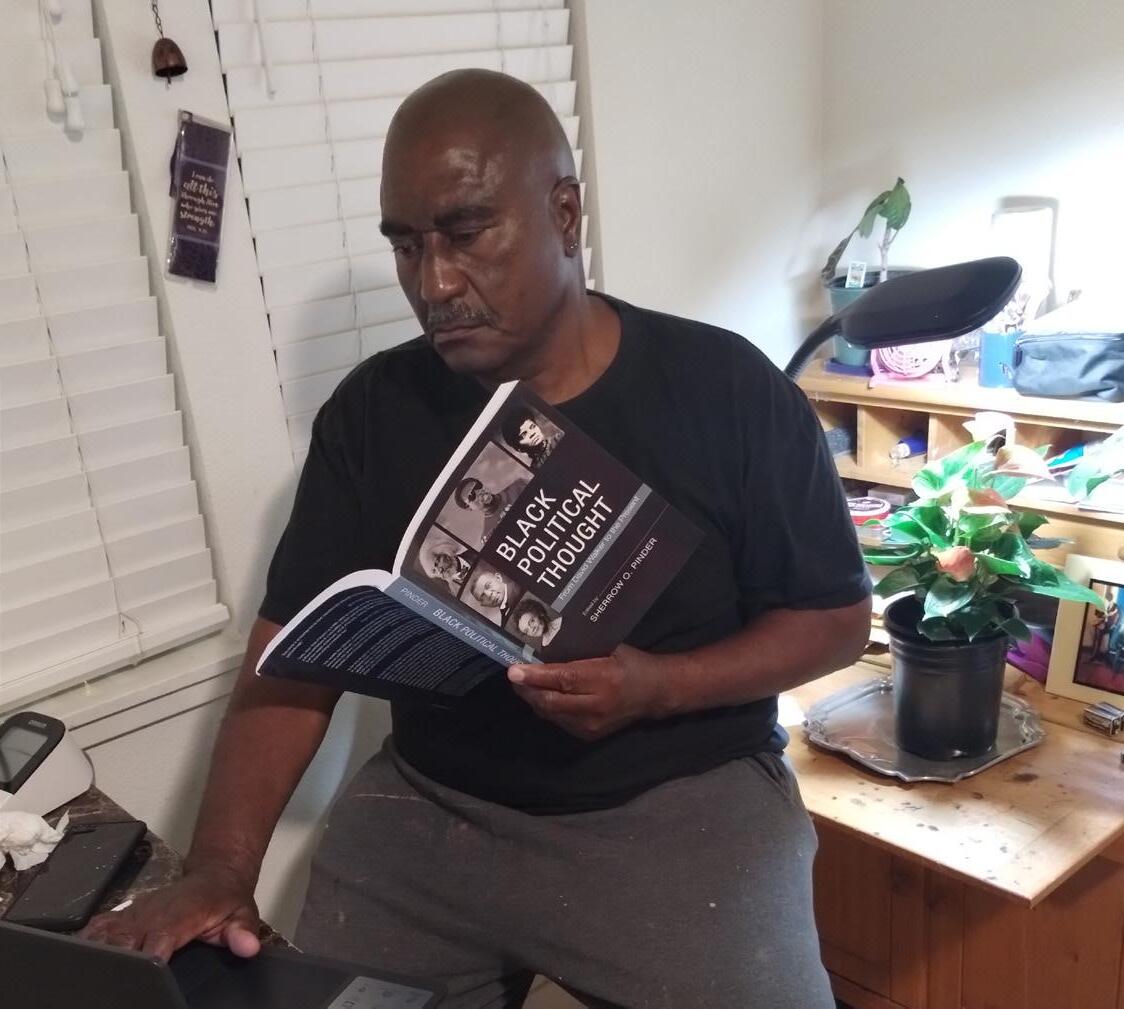 Photo by family member. Donald Diggs and his girlfriend.
Photo by family member. Donald Diggs and his girlfriend.
12 | EXCELL NETWORK MAGAZINE - Spring 2024 - Ninth Issue sfarch.org/excellnetwork
Photo by family member. Donald Diggs studying at home.
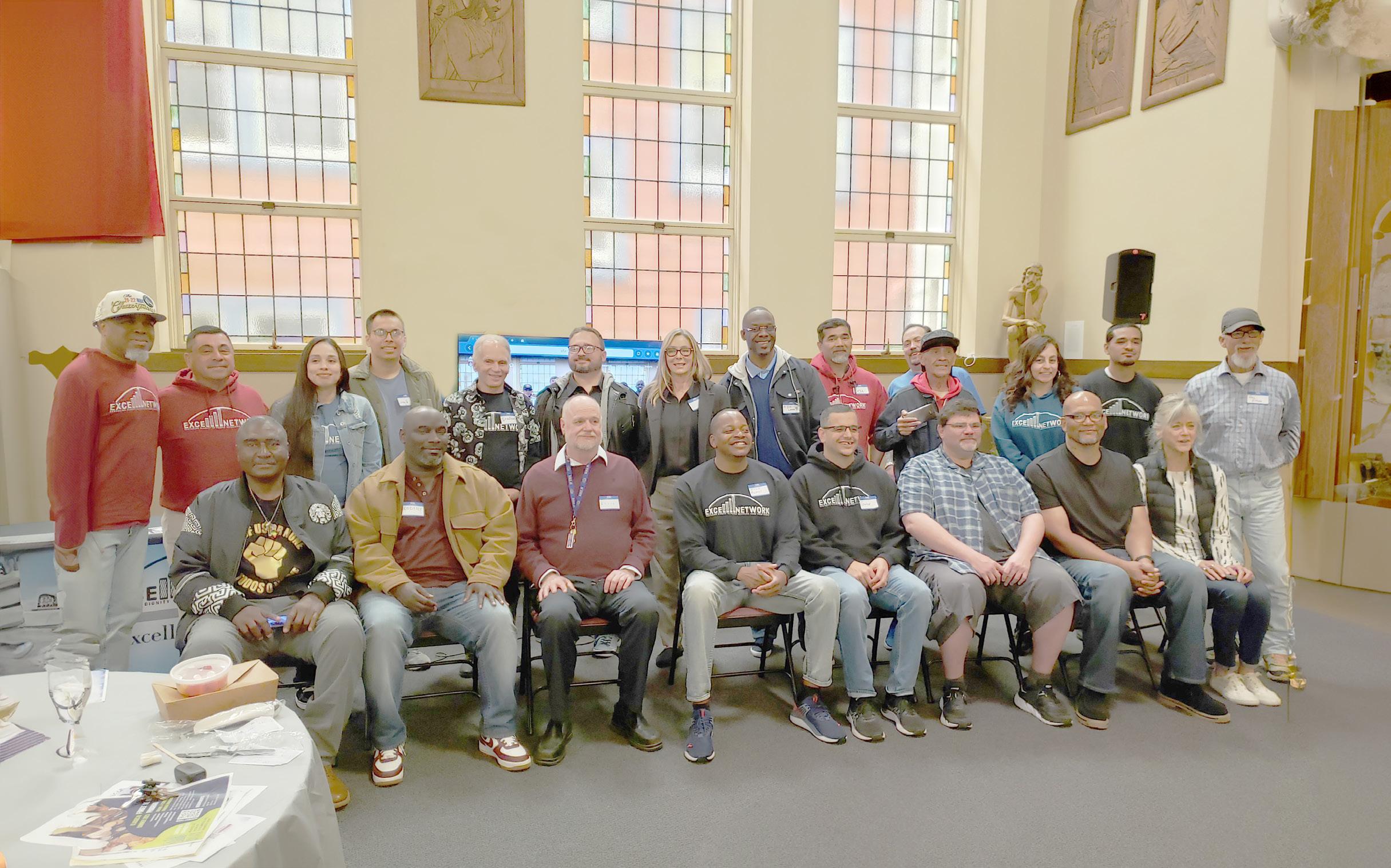
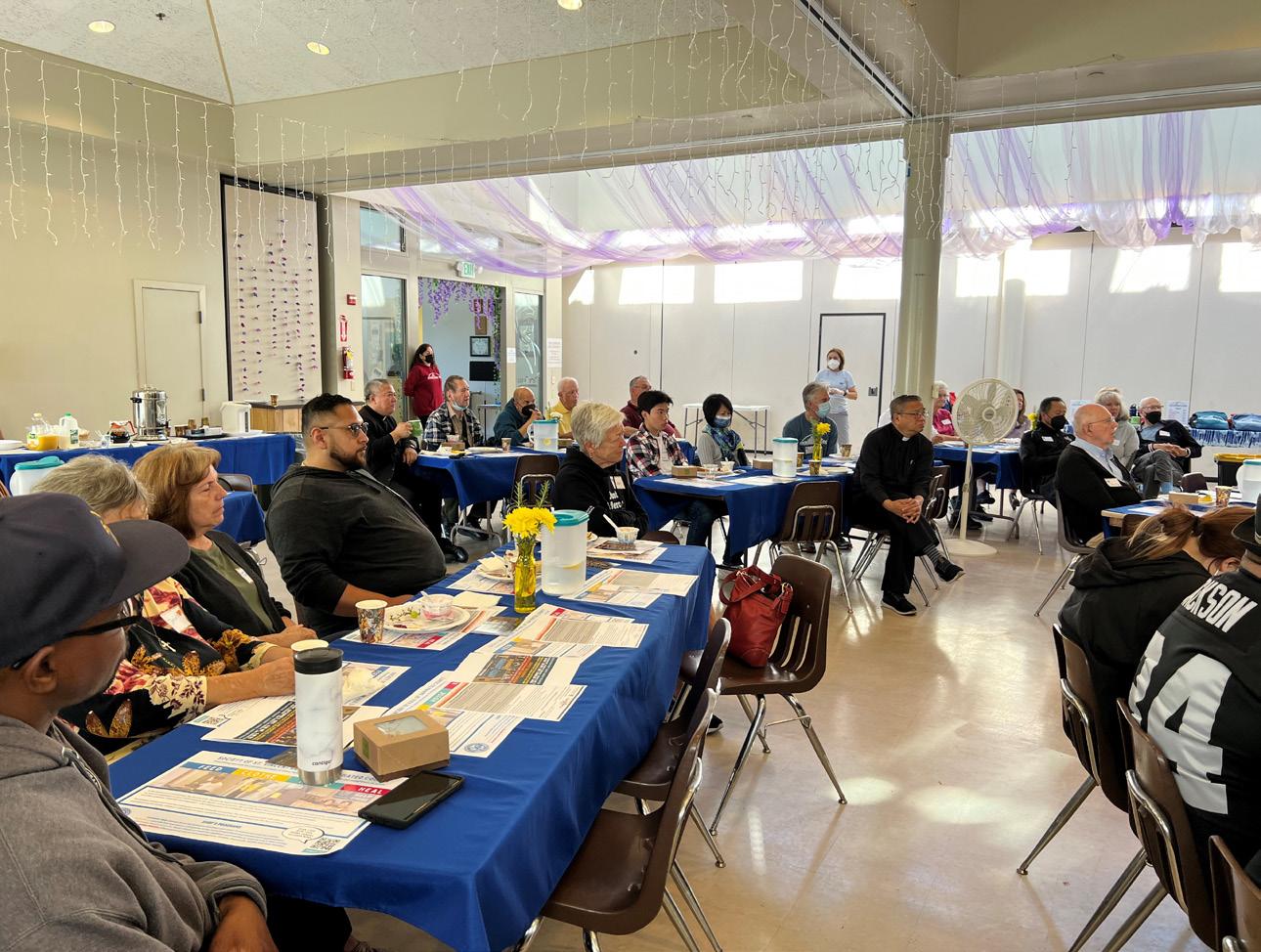
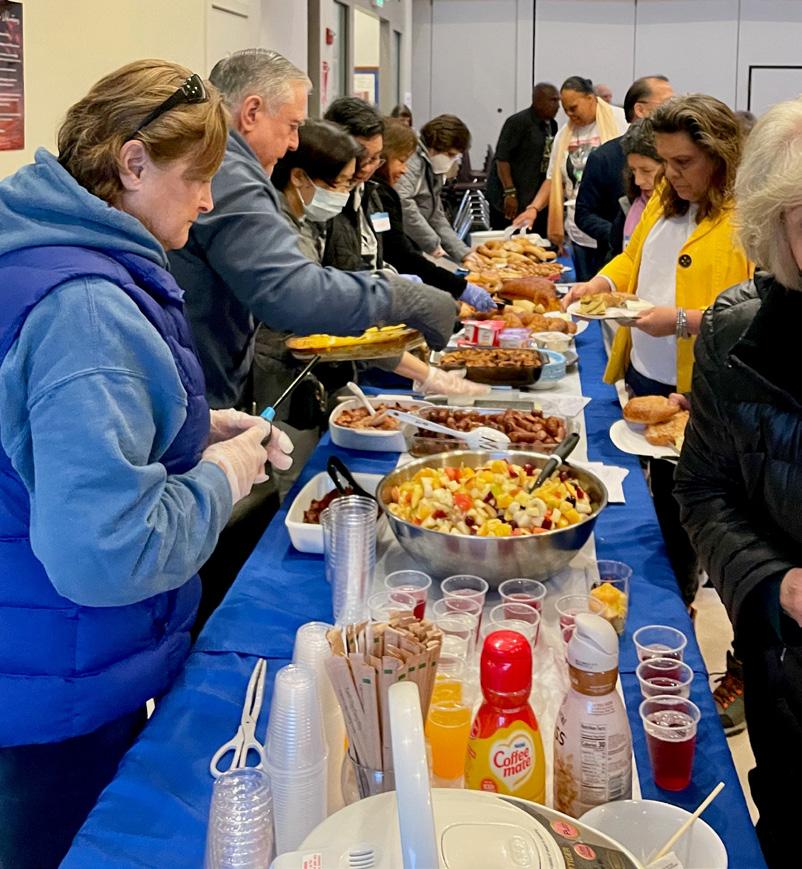

MONTHLY BREAKFAST
It’s not just the money! The Excell Network Reentry Scholarship Program offers a community of support for those trying to reenter society after incarceration. We offer mentoring and other support. A key component is the Excell Network Monthly Breakfast.
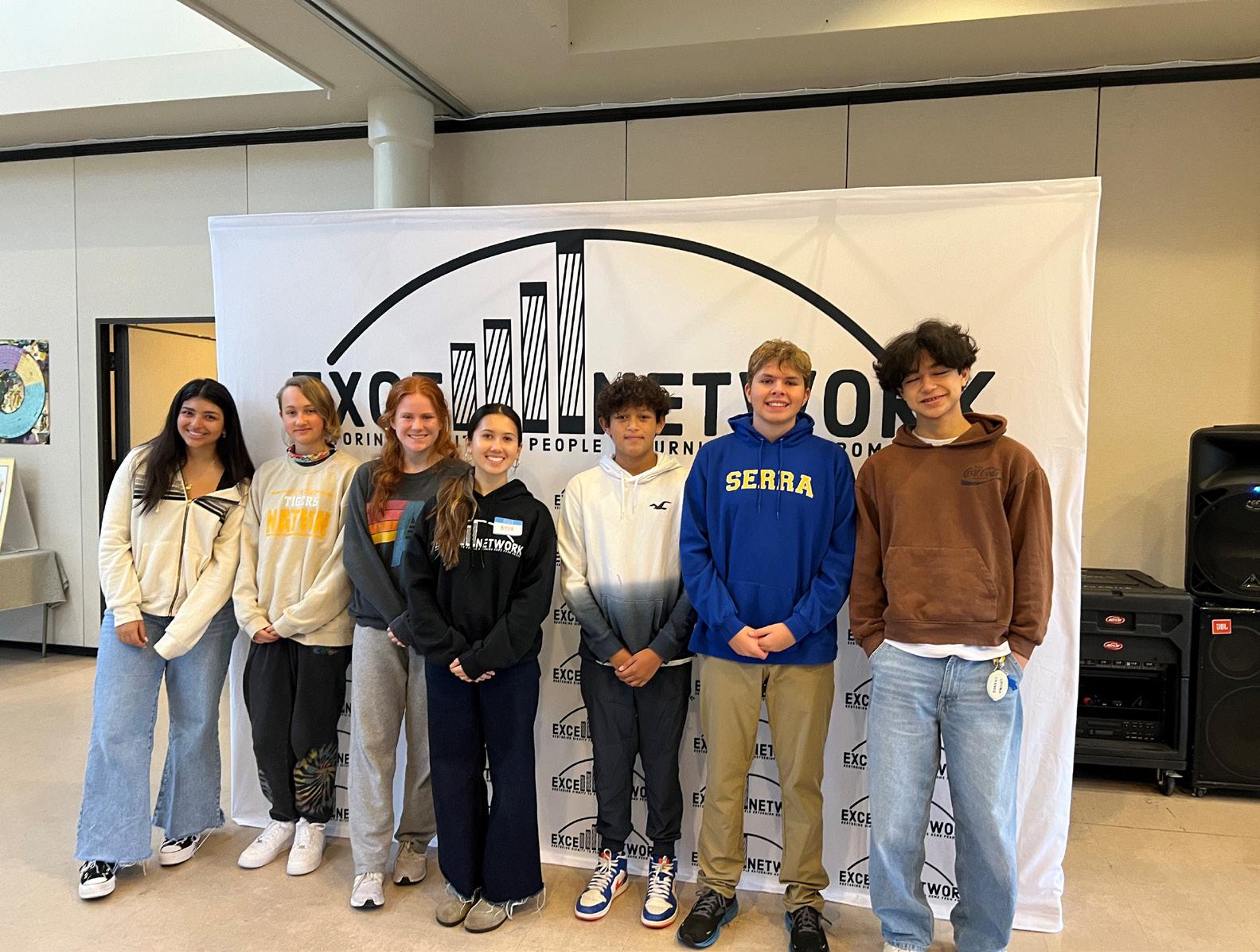

Excell Network
Monthly Breakfast in San Francisco
BREAKFASTS ARE THE SECOND SATURDAY OF EACH MONTH.
Archdiocese of San Francisco 1 Peter Yorke Way San Francisco, CA 94109
Excell Network Monthly Breakfast in Belmont
BREAKFASTS ARE THE THIRD SATURDAY OF EACH MONTH.
Support Our Programs
www.sfarch.org/excellnetwork-donate
St Mark Catholic Church 325 Marine View Ave Belmont, California 94002
sfarch.org/excellnetwork EXCELL NETWORK MAGAZINE - Spring 2024 - Ninth Issue | 13
RESTORATIVE JUSTICE BREAKFAST STUDENT
The Excel breakfasts have been a tremendous source of comfort for me. Among the many challenges that I’ve faced since my release from prison has been the feelings of isolation and “imposter syndrome”. Being able to share a meal with those who are facing the same challenges and others who are genuinely there to support us is a source of comfort and inspiration. Thank you to all who make those breakfasts possible!
JOSEPH BEAMAN
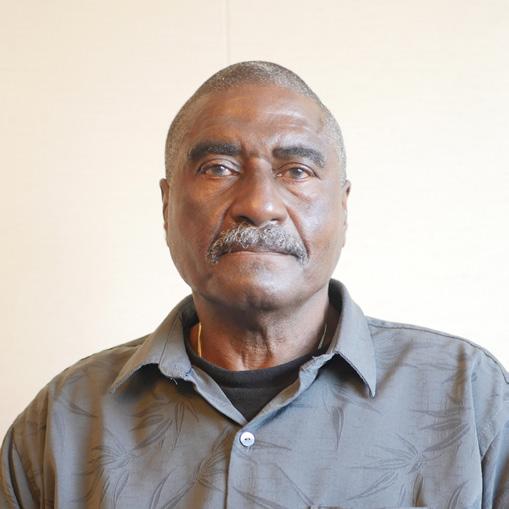

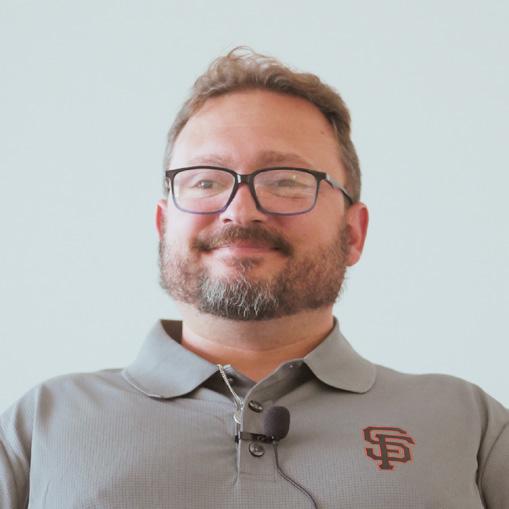
Within the supportive framework of The Excell Network, I find the pillars of my strength. Their collective support and guidance, coupled with the broader community backing, shape my journey towards becoming the best version of myself. I extend my gratitude to Excell Network, acknowledging that, along with divine guidance, it plays pivotal roles in my accomplishments.
DONALD DIGGS
The Excell Network breakfast is very supportive. I find myself around people who has dedicated their lives to justice impacted individuals who otherwise wouldn’t have stood a chance. Justice impacted people who DO NOT deserve the kindness, hospitality and support given. Still, we are welcomed with open arms. All under the leadership of Julio Escobar.
RODNEY THOMPSON

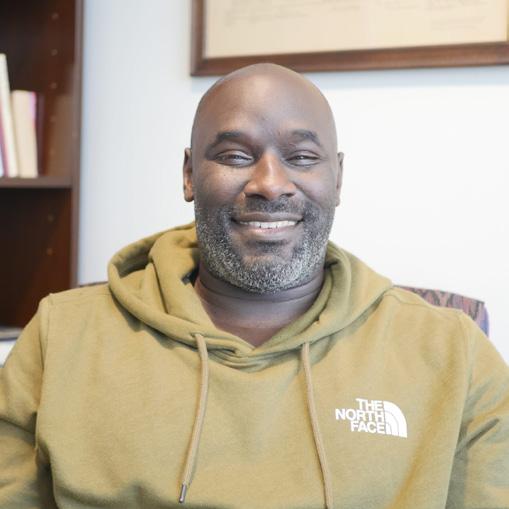
Every Excell Network breakfast that I attend always inspires me with such welcoming hearts who want to see growth and progress for individuals that have been affected by the prison system. I especially have had my heart melted from all the love and openness towards me by everyone that I have come across every Saturday. I found it truly remarkable that so many care so deeply for their fellow human community and I hope the Excell Network will continue long into the future.
BOUALAY SENGSAVANG
Excell Network breakfasts have been very helpful for me with my transition back into society by creating a non-judgmental space that has allowed me to share my story and work on the shame that comes with my past.
BILLEY LEE

14 | EXCELL NETWORK MAGAZINE - Spring 2024 - Ninth Issue sfarch.org/excellnetwork
JUSTICE EXCELL NETWORK STUDENT TESTIMONIALS


Excell Network has given me a purpose, spirituality, grounding, and a community of like-minded, and compassionate individuals seeking and providing support for positive change. Truly my family!
LINDA HURSHMAN
School is food for the mind - for us to achieve the knowledge and wisdom God wants us to have. Fellowship is food for the soul - to gain the strength to properly harness the gifts graced us by God. Breakfast is food for the bodyso that we have the fuel to keep the fire God placed within us burning bright to become the best versions of ourselves. Since I joined Excell Network their breakfast gatherings have given me all three. I am forever grateful for God putting them in my path.
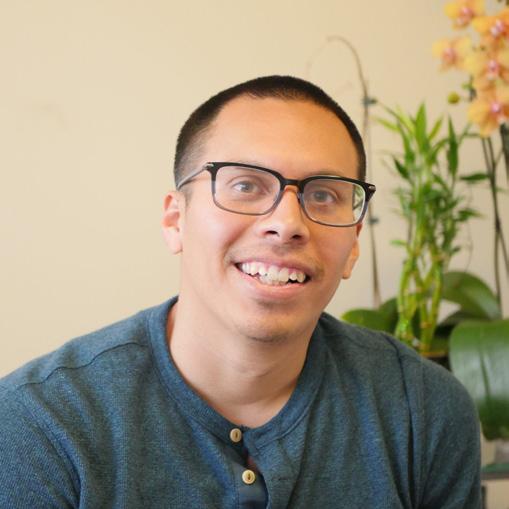
JOSEPH KRAUTER

Excell Network serves as a nurturing environment where I can cultivate meaningful connections and foster personal growth alongside others. I have flourished in my professional endeavors, and this coming Spring, I am set to graduate with a bachelor’s degree in science. My previous uncertainties now seem distant, and I am confident that my journey will continue to be marked by success and growth as I move forward. Every month I look forward to sharing a breakfast with Excell Network.
JESSY MARTINEZ
I have been attending the monthly prayer breakfasts for three years and each one is unique and special. These events allow Excell Network to go into the communities to bridge the gap, erase stigma, and humanize justice-impacted persons and their experiences. Excell Network has done a magnificent job in creating an inviting and warm atmosphere where ‘Saint’ and ‘Sinner’ can fellowship together glorifying God.

JOHN CUNNINGHAM
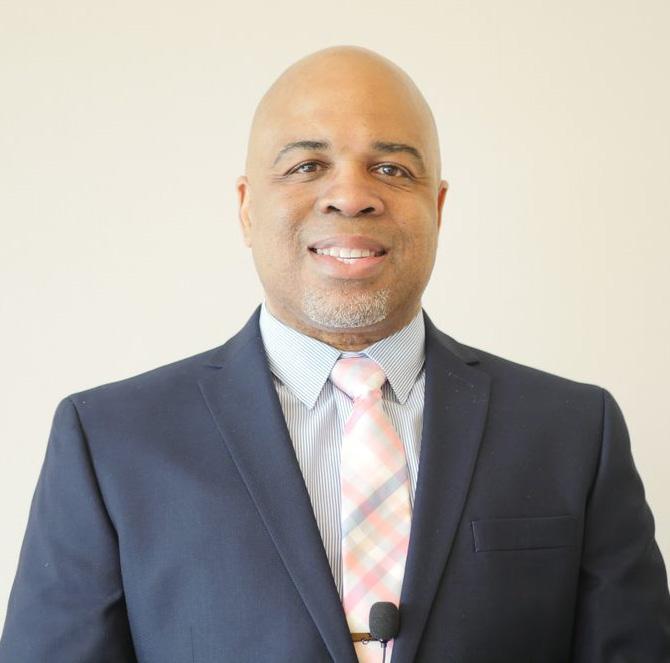
The Excell Network has been one of the most amazing agencies I have the pleasure to be a part of. Through Excell Network I have grown in my confidence in public speaking. In the Excell Network I have found my voice and my place in society, and I have had all the Excell Network students that I can lean on. I am so grateful to be a part of this program!
KATHRYN ROMAN
sfarch.org/excellnetwork EXCELL NETWORK MAGAZINE - Spring 2024 - Ninth Issue | 15



16 | EXCELL NETWORK MAGAZINE - Spring 2024 - Ninth Issue sfarch.org/excellnetwork EXCELL NETWORK HOW TO DONATE? S C H O L A R S H I P F U N D What Does My Gift Do? For More Information Visit or Call (415) 614-5572 DONATE TO Ensures education opportunities that creates a pathway for formerly incarcerated people’s reintegration. SCAN HERE Other ways to donate Donate by Check or Money Order Please make Check or Money Order payable to: ADSF - Restorative Justice Ministry Attn: Excell Network Scholarship Stipend Fund 1 Peter Yorke Way San Francisco, CA 94109 sfarch.org/excellnetwork |










 Julio Escobar Coordinator Restorative Justice Ministry
Julio Escobar Coordinator Restorative Justice Ministry







 By Dana Perrigan Writer | Journalist | Book Author
By Dana Perrigan Writer | Journalist | Book Author








 Photo by family member. Donald Diggs and his girlfriend.
Photo by family member. Donald Diggs and his girlfriend.



















